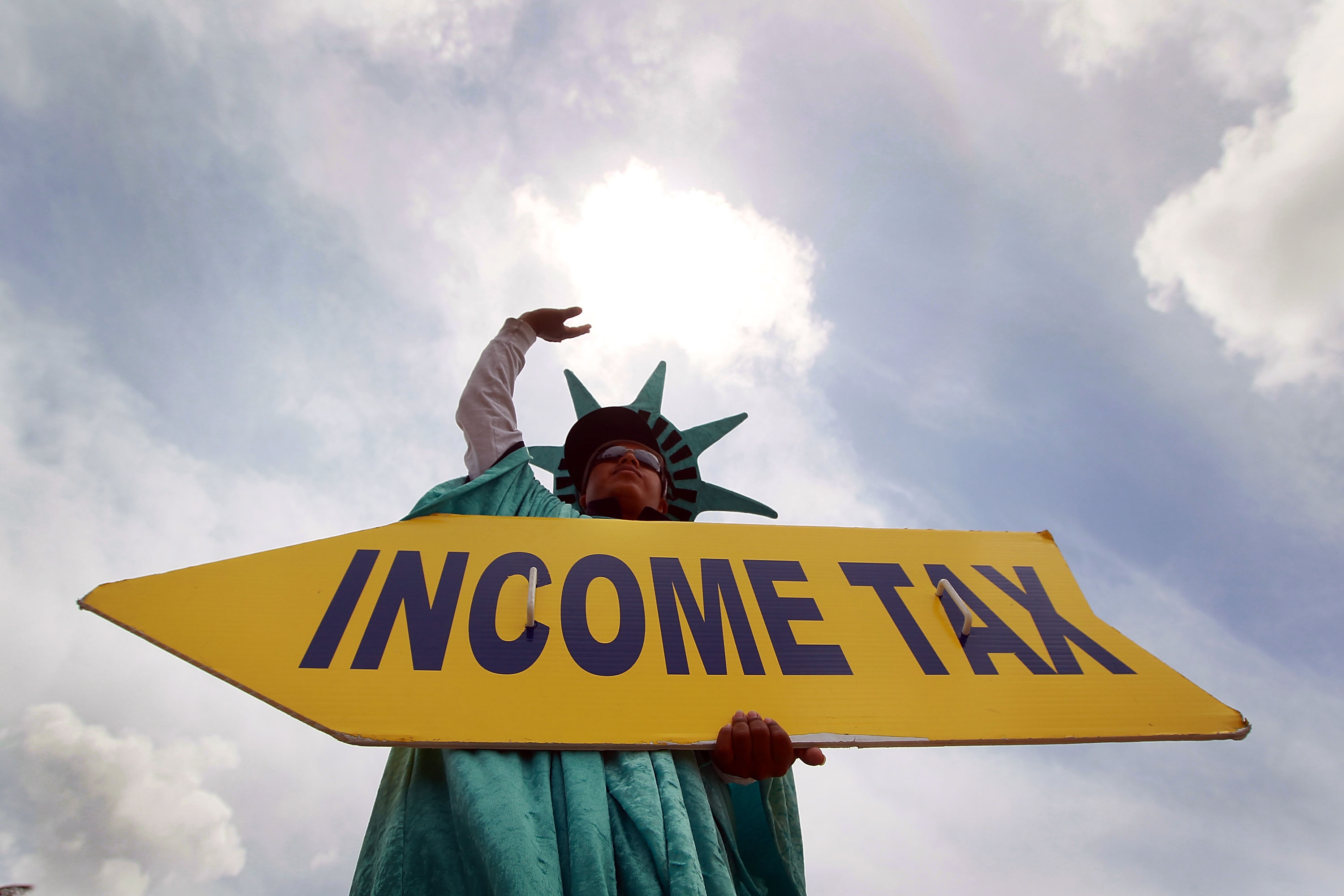What if you could tell the government exactly how to spend your tax dollars?
They'd probably still screw it up somehow


It's coming: that April 15 deadline that nearly every American taxpayer knows and dreads. For those of us who have to cut a big check to Uncle Sam every spring, tax day can stir feelings of resentment, as we painfully ship large amounts of our hard-earned income to an increasingly large and increasingly unaccountable federal bureaucracy.
But what if we had more control over where exactly our tax dollars went? Would that return a sense of self-governance and accountability that the current system — and our politics — fails to provide?
Those questions come up in light of Public Radio International's Cara Miller interview with Harvard Business School professor Michael Norton on how to re-energize enthusiasm for paying taxes. That's no easy feat, Norton tells Miller. "Most people don't like poison," Norton jokes, arguing that the real problem is that government is "taking your money away, and you don't know what it's being used for." Without knowing the specific return, people end up complaining about taxes in general.
The Week
Escape your echo chamber. Get the facts behind the news, plus analysis from multiple perspectives.

Sign up for The Week's Free Newsletters
From our morning news briefing to a weekly Good News Newsletter, get the best of The Week delivered directly to your inbox.
From our morning news briefing to a weekly Good News Newsletter, get the best of The Week delivered directly to your inbox.
Norton and other researchers at the University of Pittsburgh and University College London conducted a study in which taxpayers could earmark their funds for specific programs or activities. Norton thought this could make it more "fun" to pay taxes. Giving people a choice not only makes taxpayers more enthusiastic about the process, it increases compliance, the thinking goes. Those who want to fund the military can offer up their contributions for that purpose, while others could fund the arts, and so on. People are more likely to pay their taxes when they have a say, and they're more likely to feel good about doing so.
So why don't taxes work this way? Well, for starters, think about the massive complexity of government, not just at the federal level, but also at the state level. The median household income in the U.S. was $52,250 in 2013, the latest year for which data exists. At an effective tax rate of 20 percent, federal tax would come to $10,450. There are between 96 and 137 independent executive agencies in the federal government, with as many as 268 component organizations. Even if the average taxpayer could identify each of those in a tax system designed to present those choices in an accessible manner, that would come to $39 per agency for anyone who wanted to fund the entire government as it is currently constituted. Things quickly become incredibly complicated — and a logistical nightmare to process.
Norton and his team understood this problem, and so devised a different scenario. Allowing taxpayers to earmark 10 percent of their contribution still provided a boost for enthusiasm and compliance, and the other 90 percent went into the general fund as happens under the current system. "We're just excited that anybody is letting us say anything about where our taxes go," Norton told Miller.
Of course, there are plenty of flaws here, too. For one thing, it's not hard to imagine an America in which Congress and the president reallocate the 90 percent of general-fund monies to cover any shortfalls from the 10 percent earmarking. No one will want to pay for the boring but important stuff.
A free daily email with the biggest news stories of the day – and the best features from TheWeek.com
This does not mean, however, that concerns over taxpayer alienation and compliance are unwarranted. They are very warranted! But the solution lies in addressing the root causes of that alienation rather than the methodology of paying taxes. People don't see a connection between their taxes and responsive government because such a connection no longer exists. The federal government has grown so large and intrusive that most people feel helpless to change its direction or policies, even if they are politically engaged. It won't matter if we have a small say in directing our tax dollars. The massive, voracious dinosaur that is our federal government will still lumber on whatever path it chooses, regardless of what we peons demand.
Tweaking the rules of how we pay the government is not enough. We need to aggressively reform government. And we need to do it through federalism and subsidiarity.
Federalism establishes sovereignty in the states for most government functions except national defense, diplomacy, and interstate commerce. The Supreme Court decision in Wickard v. Filburn distorted the definition of the latter, and became one of the predicates for the massive expansion of federal government that followed. Reversing Wickard would likely take a constitutional amendment to narrow the definition of "interstate commerce," and to curtail federal jurisdiction in favor of state and local government that would be closer to the taxpayer, and therefore more accountable.
Subsidiarity, which suggests that things are best handled by the smallest, most localized authority possible, follows from a restoration of federalism. Subsidiarity would handle as much as possible at the local level.
Norton mentions that filling potholes doesn't capture the imagination of taxpayers. That's certainly true for Nebraskans whose tax dollars are filling potholes in a highway in Massachusetts. For people who have to keep driving over the same pothole, though, the situation becomes a lot more acute. And thanks to the immediacy of accountability of local government, they are a lot more likely to influence how those dollars get spent, rather than wait for Congress to allocate hundreds of billions of dollars in highway funds that have historically acted as clearinghouses for legislators' pork-barrel posturing.
Taxpayers feel alienated and ignored. They are right to feel that way. Government has made this alienation the reality, not just the perception. Playing games at tax season would insult the intelligence of Americans, who deserve the kind of self-government that the Constitution promises, and which big-government politicians fear.
Edward Morrissey has been writing about politics since 2003 in his blog, Captain's Quarters, and now writes for HotAir.com. His columns have appeared in the Washington Post, the New York Post, The New York Sun, the Washington Times, and other newspapers. Morrissey has a daily Internet talk show on politics and culture at Hot Air. Since 2004, Morrissey has had a weekend talk radio show in the Minneapolis/St. Paul area and often fills in as a guest on Salem Radio Network's nationally-syndicated shows. He lives in the Twin Cities area of Minnesota with his wife, son and daughter-in-law, and his two granddaughters. Morrissey's new book, GOING RED, will be published by Crown Forum on April 5, 2016.
-
 Must-see bookshops around the UK
Must-see bookshops around the UKThe Week Recommends Lose yourself in beautiful surroundings, whiling away the hours looking for a good book
-
 A Nipah virus outbreak in India has brought back Covid-era surveillance
A Nipah virus outbreak in India has brought back Covid-era surveillanceUnder the radar The disease can spread through animals and humans
-
 Nasa’s new dark matter map
Nasa’s new dark matter mapUnder the Radar High-resolution images may help scientists understand the ‘gravitational scaffolding into which everything else falls and is built into galaxies’
-
 The billionaires’ wealth tax: a catastrophe for California?
The billionaires’ wealth tax: a catastrophe for California?Talking Point Peter Thiel and Larry Page preparing to change state residency
-
 Bari Weiss’ ‘60 Minutes’ scandal is about more than one report
Bari Weiss’ ‘60 Minutes’ scandal is about more than one reportIN THE SPOTLIGHT By blocking an approved segment on a controversial prison holding US deportees in El Salvador, the editor-in-chief of CBS News has become the main story
-
 Has Zohran Mamdani shown the Democrats how to win again?
Has Zohran Mamdani shown the Democrats how to win again?Today’s Big Question New York City mayoral election touted as victory for left-wing populists but moderate centrist wins elsewhere present more complex path for Democratic Party
-
 Millions turn out for anti-Trump ‘No Kings’ rallies
Millions turn out for anti-Trump ‘No Kings’ ralliesSpeed Read An estimated 7 million people participated, 2 million more than at the first ‘No Kings’ protest in June
-
 Ghislaine Maxwell: angling for a Trump pardon
Ghislaine Maxwell: angling for a Trump pardonTalking Point Convicted sex trafficker's testimony could shed new light on president's links to Jeffrey Epstein
-
 The last words and final moments of 40 presidents
The last words and final moments of 40 presidentsThe Explainer Some are eloquent quotes worthy of the holders of the highest office in the nation, and others... aren't
-
 The JFK files: the truth at last?
The JFK files: the truth at last?In The Spotlight More than 64,000 previously classified documents relating the 1963 assassination of John F. Kennedy have been released by the Trump administration
-
 'Seriously, not literally': how should the world take Donald Trump?
'Seriously, not literally': how should the world take Donald Trump?Today's big question White House rhetoric and reality look likely to become increasingly blurred
